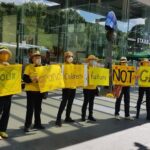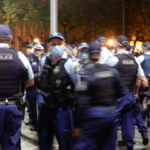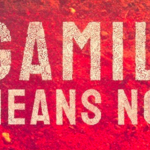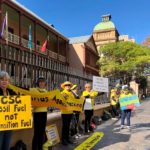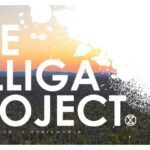Taxpayers Fund Forest Depletion in NSW: Knitting Nanna Dominique Jacobs on Stopping Logging
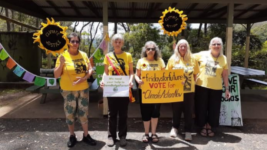
The extreme climate-driven bushfires over the summer of 2019/20 burnt down 20 percent of mainland forest. And one might expect such devastation would lead authorities to rush to preserve the pockets of remaining wildlife, however this is Australia.
Indeed, in the wake of the wildfires, state governments got straight back to logging the remaining forests, as if, with only depleted resources left, they have to ensure they claw the profit out, prior to any future extreme weather event or human intervention preventing this.
That’s why climate and forest defenders are determined to prevent the logging of the Bulga State Forest, which is located on Biripi Country on the NSW Mid-North Coast. And although the Bulga is only a small area of pristine wildlife, the impact of its destruction will be widespread.
Writing in Independent Australia last week, journalist Sue Arnold points out that despite logging being an increasingly critical issue, with the NSW regional forestry agreement set to be renewed next year, the mainstream media aren’t focusing upon it in the leadup to this month’s state election.
Concealing the crisis
The Coalition government is pleased logging is off the agenda. It would prefer that fossil fuel expansion could be pushed aside as well, so that it wouldn’t come under scrutiny, as was evidenced by NSW premier Dominic Perrottet privately promising state-funded new coal.
But the climate issue, now hard to deny with entire towns wiped out by climate-driven floods, is of rising concern amongst the wider populace, so the Perrottet government, last April, enacted antiprotest laws so draconian that public protest around climate has been suppressed.
Soon coming up to 12 months in operation, the protest laws prevent climate defenders, or any other protesters, from taking unauthorised nonviolent direct action that obstructs a major road, tunnel, bridge or major facility, via threat of up to 2 years imprisonment and/or a $22,000 fine.
Breaking the regime
The Perrottet government’s antiprotest regime was implemented at a time of rising climate action. And while this suppression of civil society’s voice should be an election issue, NSW Labor was only too pleased to assist in rushing the laws through, despite the opposition of some of its members.
In March last year, Blockade Australia staged five days of disruptive protests at Sydney’s Port Botany, while Fireproof Australia was carrying out road blockages across Greater Sydney, one of which made NSW roads minister Natalie Ward late for work and then go on to promise severe penalties on 2GB.
Knitting Nanna Dominique Jacobs was arrested over the Port Botany demonstrations, and on conviction, she received a conditional release order (CRO): a far lesser sentence than may be likely now.
Jacobs asserts the antiprotest regime has led to its desired effect of stifling direct actions. So, she and a fellow member of the Knitting Nannas activist group are about to challenge the extreme measures in court.
Sydney Criminal Lawyers spoke to Knitting Nanna Dominique Jacobs about bringing logging in the Bulga Forest to an end, the reasons she’s challenging the Perrottet government’s harsh protest laws, and why it’s important to continue fighting for humanity and planet.
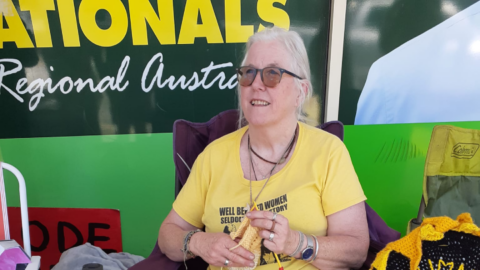
Dominique, you’re one of two Knitting Nannas who’ve lodged a legal challenge against the Perrottet government’s antiprotest regime, which it enacted last April. You’re being represented by the Environmental Defenders Office.
Whilst you can’t go into the details of your case, can you outline why you were compelled to launch this legal action, as well as how you consider the relatively new laws?
We’re bringing this case to defend our freedom to protest from the NSW government’s new antiprotest laws.
As mothers, wildlife carers and Knitting Nanas, who use our freedom to protest to push for climate action, while floods and bushfires destroy our communities around us, this attack on our democratic freedoms is a slap in the face.
We’re asking the court to find that aspects of the new laws are unconstitutional.
Australians like us shouldn’t have to risk imprisonment or bankruptcy to participate in our democracy, and the government should not be taking away our democratic freedoms.
Currently, you’re campaigning against the logging of the Bulga Forest, which is located on Biripi Country in the NSW Mid-North Coast. And whilst this forest is relatively small in size, it’s vital it’s preserved.
Can you tell us a little about the Bulga and why you’re attempting to prevent its destruction?
Firstly, and very simply, to address the climate emergency we are told that we must stop deforestation and any new fossil fuel projects.
This is my first time being involved in forest actions, so I’ve been learning a lot about forests and the Forestry Corporation.
The Bulga Forest is about two hours drive from my home in Gloucester. The people of Elands and friends have taken a stand to protect this forest. They did it 30 years ago.
I wanted to support them as they try to protect it again. However, I am limited in what I can do because I’m on a 12 month good behaviour bond.
The Bulga compartments – forests – are at the top of the catchment. They are vital for water production, storage and a reliable water supply.
They mitigate floods, stop erosion, siltation, and sedimentation and this has an effect on everyone downstream.
The forests are the home of multiple creatures. Many are hollow dependant. It takes 100-plus years to form the hollows that they need – so we need old trees.
Native forest logging in NSW has to stop, particularly in the publicly-owned state forests. There is overwhelming evidence that this is what most people want and yet governments, the Liberal Nationals and Labor, all keep it going.
Annual accounts for NSW Forestry Corporation, showed its hardwood or native timbers division ran at a $9 million loss in 2021/22. That is taxpayers paying $9 million for the destruction of our forests.
Can you believe that we are destroying forests and it’s costing us to do this? I’m a wildlife carer. I know that life is tough out there for our animals.
A recent report in Independent Australia suggests that the mainstream media is neglecting to report on the industrial logging of native forests in this state, whereas this should be an election issue.
The next review of the NSW regional forestry agreement is set to take place next year, yet a recommendation from an earlier review suggesting that climate change be considered in relation to logging has not been acted upon.
In your understanding, how problematic is the way the logging industry is operating in NSW, and why is it being left off the agenda?
Logging happens away from population centres. Most people have no idea that the government logging agency is responsible for most of the forest destruction and that they run at a loss.
Logging and forests haven’t been newsworthy for quite some time. All the big NGOs are now climate focussed, because the donor funding is climate focussed.
There is much less time to turn the biodiversity crisis around than the climate one. Most of the habitat for the hollow dependent species in state forests will be gone by 2030.
The climate movement has failed to acknowledge the vital role of forests in carbon capture and storage, as well as providing shade and coolth and water.
They’re worried that forest protection will be used as an offset for coal and gas and hence, there is negativity and hesitance around discussions about forest protection as a climate action.
Logging is now more heavy machinery removing everything that can be sold, which includes small trees for firewood and pulp, so what’s left behind is a virtual clear-fell in many places or just young saplings, leaving the forest more fireprone, with more debris on the forest floor drying out, as the sun penetrates and is not held out by the canopy.
Also, there’s less rainforest regeneration. The industry logged the rainforest and the old growth almost until they were completely gone.
They are doing the same to the intact habitat components of native forest. Trying to turn the forest into something that is managed like a plantation that is cleared, rather than leaving most of the forest and selectively removing a few trees.
In 2016, you were charged over having locked on to a wastewater plant in Narrabri with two other Knitting Nannas. The plant is attached to Santos’ Narrabri gas project, which involves plans to drill 850 coal seam gas wells on Gomeroi Country and straight through the Great Artesian Basin.
In December, the National Native Title Tribunal gave the go ahead to the project despite a decade of campaigning against it on the part of the Gomeroi Nation.
What are your thoughts on how far Narrabri gas has progressed since you were arrested for agitating against it, especially when the traditional owners have been so clear in their opposition?
It’s unbelievable really. So much opposition from so many different parts of society.
Direct action, arrests, legal challenges, petitions, meetings, lobbying politicians. There were 23,000 submissions to the Independent Planning Commission, but this project is like a zombie, you can’t seem to kill it.
The state government, under Mike Baird, changed protest laws back then too to stifle protests in the Pilliga.
There are so many great reasons to kill this project: the climate emergency, the Great Artesian Basin, the Pilliga forest.
Gomeroi man Raymond Weatherall said, “Every tree, every bird, every animal is part of that beautiful ecosystem that is so special to us. Our land is worth more than money.”
And lastly, Dominique, you’ve long been on the frontline of mobilising against the fossil fuel industries, which are escalating the climate crisis.
Over the six years since you were arrested in relation to your action in Narrabri, extreme weather events have been ever-increasing.
How do you consider the state of the climate crisis at present? And considering how the authorities are approaching it, how do you consider our chances of abating it?
Escalating, terrifying, unknown. I read and listen to lots of podcasts on the climate and have done so for years. There isn’t really any good news.
It doesn’t seem real that we are living in this absolute emergency and yet, we still live our everyday lives as if it’s not really happening.
It’s hard to get your head around. I protest because I couldn’t live with it and the injustice of it all if I didn’t.
The authorities are endlessly disappointing. They are weak and will only be forced into the appropriate response and action when enough of us stand up and force them to do it.
It’s so hard when there is so much dishonesty from government, corporates and the media around the climate and biodiversity crises.
We can’t lose hope. We need to be active participants in the fight for our lives and all life on this beautiful planet.


